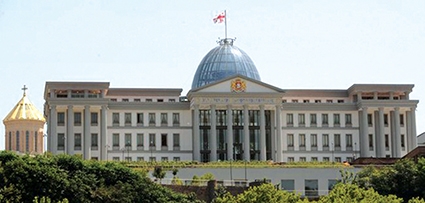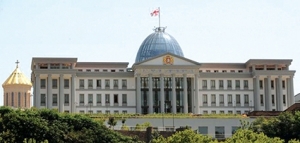NGOs Call on President to Veto Self-Government Code Bill
After filing a lawsuit in Kutaisi City Court, Georgian non-governmental organizations (NGOs) requested the President of Georgia, Giorgi Margvelashvili, veto the Self-Government Code amendments adopted by Parliament on June 30 with the third reading, which envisages reduction of self-governing cities.
The NGOs are protesting the decision to abolish the status for seven self-governing cities and reduce the number of municipalities.
Among 14 municipalities, seven are self-governing cities (Zugdidi, Ozurgeti, Gori, Telavi, Akhaltsikhe, Mtskheta and Ambrolauri), which will lose their status and be transformed into municipalities.
Moreover, the number of self-governing cities will be reduced from twelve to five. This means that during the local elections scheduled for this October, mayors will only be elected in Tbilisi, Batumi, Rustavi, Kutaisi and Poti, while the remaining cities will be left without a mayor.
As a result of the planned changes, there will be five self-governing cities and seven municipalities in the country.
At the parliament session, 83 MPs voted for the amendments to the organic law with 5 against.
The NGOs sent an open letter to the President, asking him not to support the amendments and expressing their readiness to discuss the issue in detail with him.
“The reduction of self-governing cities is directly linked with the reduction of the quality of local democracy,” Zviad Devdariani, Executive Director of NGO CIDA, stressed.
The organizations claim that the ruling Georgian Dream (GD) party, which has a supermajority in Parliament with 116 MPs, made the decision unanimously, without holding any consultation with the population.
The organizations believe that this action will be a step backwards for the country. “It is unacceptable to abolish the self-governing entities formed after 2014,” they say.
Ana Dolidze, Parliamentary Secretary of the President of Georgia, responded to the NGO appeal, noting that the appeal is important as the fundamental changes refer to self-governing cities, and that the President will take it into consideration.
"From the very beginning, the President of Georgia was skeptical about the changes concerning the self-government and self-governing cities,” she said.
Giorgi Kakhiani, Chair of the Procedural Issues Committee of Parliament, says that the decision was made within the law and observing all procedures.
“The court will make a decision on the issue,” he added.
The opposition parties also share the position of the NGOs and claim that after the changes to the Self-Government Code, the local population will be less involved in the decision-making processes.
“The implemented changes reject the interests of locals and, on the financial side, the unified municipalities will face serious problems,” member of the opposition United National Movement, Giorgi Botkoveli, said.
However, the majority believes that by reducing the number of self-governing cities and municipalities, they will reduce expenses from the state budget.
Thea Morrison












